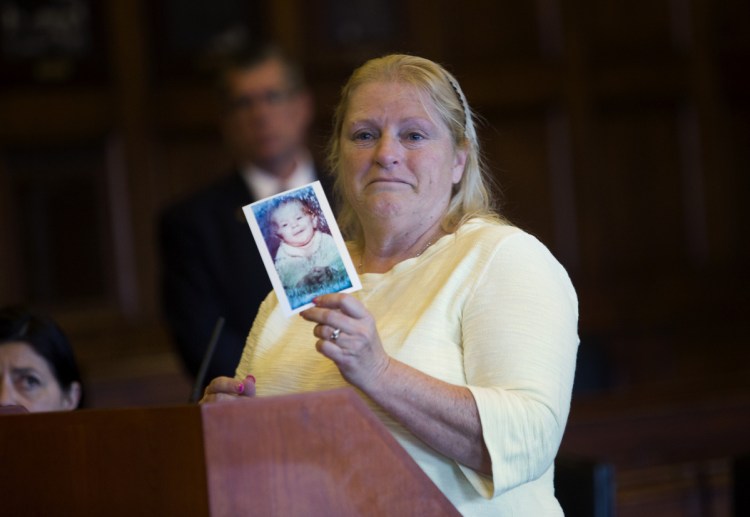The photograph in Venus Nappi’s hand was faded by nearly four decades of passed time, but the smile on the baby’s face was still clear.
“We keep talking about my son,” Nappi said. “I’d just like you all to know who my son was.”
The woman stood at the lectern Tuesday in Cumberland County Unified Criminal Court, mere feet from her ex-husband, Burton Hagar, who had just pleaded guilty to manslaughter in the death of their infant son, Nathan Hagar, in 1979. Her voice was thick with emotion, but her hand was steady as she held the picture up for the few people gathered in the Portland courtroom to see.
“I’m really glad that he gets some justice for all the things that were done to him,” Nappi said of her son. “And I guess I just want you to know how nice he was.”
Hagar, 63, will now begin a 15-year prison sentence. But his unusual case is not over, despite the plea agreement. His lawyer, Verne Paradie, plans to launch an appeal to the Maine Supreme Judicial Court, challenging a judge’s ruling that the baby’s death 39 years ago was a homicide and not a case of Sudden Infant Death Syndrome. Hagar’s guilty plea was conditional, meaning he can withdraw it if the Supreme Judicial Court determines a crime wasn’t committed and dismisses the case.
BOY’S DEATH INITIALLY ATTRIBUTED TO SIDS
The agreement sets up a battle at the state’s highest court in part about the credibility of Hagar’s repeated confessions.
Nathan Hagar was 4 months old when he died in his crib in a Brunswick apartment on May 9, 1979. His death was initially attributed to SIDS, but his father later told more than a dozen people that he smothered the infant with a pillow. Maine State Police videotaped his admissions in 1991 and last year.

Burton Hagar pleaded guilty to manslaughter Tuesday in the death of his infant son, Nathan Hagar, in Brunswick in 1979.
He was not charged until April 2017, however, after he told state police twice more that he had killed the baby. That’s because in Maine, as in most other states, a confession alone is not enough for a conviction. The state also needs to prove that a crime has taken place.
In April, a Brunswick police officer testified to Superior Court Justice Thomas Warren that he found a pillow stained with mucus on one side in Nathan Hagar’s crib when he responded to the call about an unresponsive baby. The pillow was not part of his initial report about the incident. A retired state medical examiner also reviewed records in the case and told the judge she would classify the infant’s cause of death as asphyxiation, not SIDS. In July, Warren ruled that the evidence that had come to light since Nathan Hagar’s death suggests the infant was likely smothered with a pillow, which allowed the homicide case to proceed.
But some states have adopted a federal standard that says a court has to find that confessions and other statements that imply guilt must be “trustworthy” for a case to move forward. Paradie will push for Maine to do the same in this case, arguing that Hagar’s statements about his son’s death have been too varied to prove his guilt. For example, the father has given different reasons about his motivations for smothering his son. He has told people he smothered Nathan to hurt his own father, but he has also said he wasn’t ready to be a father himself. And he told some people that he had been drinking and smoking pot on the night Nathan died and can’t really remember a reason for smothering the baby.
“I’m hoping that the Law Court will adopt the federal standard for corpus delicti, which is basically that you can’t convict someone on an unreliable confession,” Paradie said. “Mr. Hagar’s confessions have been so inconsistent and unreliable that I hope the Law Court sees that, because there is no physical evidence linking him to this at all.”
JUDGE: PLEA AGREEMENT ‘A FAIR RESULT’
At Tuesday’s hearing, however, Assistant Attorney General Lara Nomani described common elements of the confessions over time.
“In the majority of these statements, the defendant consistently described how he smothered baby Nathan with a pillow,” she said.
As he accepted the plea agreement, the judge noted that Hagar has expressed remorse for the death of his son and has been treated for mental health issues.
“With all that said, I think that this is a fair result,” Warren said.
Paradie said he had urged his client to go to trial because he believed he would win the case, but Hagar wanted to plead guilty instead. His attorney predicted it would likely take more than a year for the Supreme Judicial Court to make a final decision on the case. Hagar spoke little during his hearing, standing with his hands clasped in front of him and wearing a tan jail jumpsuit.
When the hearing ended, a woman in the audience hugged Nappi before she approached Paradie to ask about visiting Hagar at the Maine State Prison in Warren. She identified herself as his family member but declined to speak to a reporter.
The small group filed quietly out of the courtroom, leaving only a box of tissues near the chair where the baby’s mother had been seated.
Megan Doyle can be contacted at 791-6327 or at:
mdoyle@pressherald.com
Twitter: megan_e_doyle
Comments are not available on this story.
Send questions/comments to the editors.



